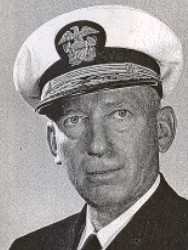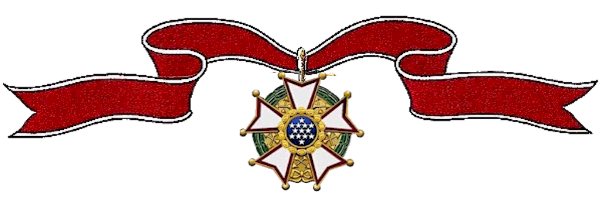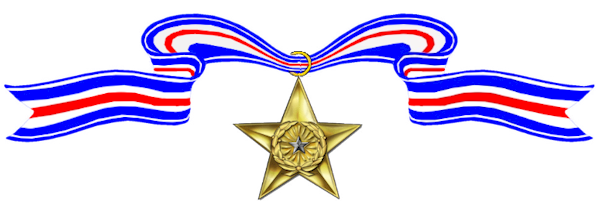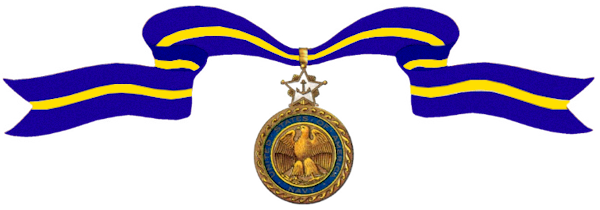Laurence Frost graduated from the U.S. Naval Academy at Annapolis, Class of 1926. He retired as a U.S. Navy Admiral.

Born:
,
Home:
,
Awards Received
-

Legion of Merit
-

Silver Star
-

Silver Star
-

Navy Distinguished Service Medal
-

Legion of Merit
-
Legion of Merit
Service:
United States NavyRank:
CaptainAction Date:
October 4, 1943 – February 26, 1945
Commander Force Area, Central Pacific: Serial 1645 (February 28, 1945)The President of the United States of America takes pleasure in presenting the Legion of Merit to Captain Laurence Hugh Frost (NSN: 0-60381), United States Navy, for exceptionally meritorious conduct in the performance of outstanding services to the Government of the United States as Communications Officer on the Staff of the Commander Aircraft, Central Pacific Force, and Commander Forward Area, Central Pacific, from 4 October 1943 to 26 February 1945. Under his direction communications systems were established and administered in the Ellice, Gilbert, Marshall, Marianas, and Western Caroline Islands which fully met the requirements of successive amphibious campaigns. His technical proficiency and outstandingly effective performance of duty were in large part responsible for efficient maintenance of communications on a scale unprecedented in naval warfare. His conduct throughout was in accordance with the highest traditions of the United States Naval Service.
-
Silver Star
Service:
United States NavyRank:
CommanderDivision:
U.S.S. Waller (DD-466)Action Date:
August 15 – 18, 1943
Commander South Pacific: Serial 002124 (October 12, 1943)The President of the United States of America takes pleasure in presenting the Silver Star to Commander Laurence Hugh Frost (NSN: 0-60381), United States Navy, for extraordinary heroism against an armed enemy as Commanding Officer of the U.S.S. WALLER (DD-466), during operations in the Solomon Islands. His ship participated in the initial occupation of Vella Lavella Island on 15 August 1943, and subsequently during the reinforcement of the American garrison on Vella Lavella on 17 and 18 August 1943, escorting the convoys carrying troops, supplies, and equipment for the occupation forces. During these periods his ship was subjected to three dive bombing attacks and two enemy torpedo plane and bombing attacks. By his courage, perseverance and determination he brought his ship through on each occasion without serious damage, prevented any damage to the convoy and materially contributed to the successful completion of the mission of the entire force. His conduct throughout was in keeping with the highest traditions of the United States Naval Service.
-
Silver Star
Service:
United States NavyRank:
CommanderDivision:
U.S.S. Waller (DD-466)Action Date:
March 5, 1943
Commander South Pacific: Serial 00472 (May 21, 1945)The President of the United States of America takes pleasure in presenting a Gold Star in lieu of a Second Award of the Silver Star to Commander Laurence Hugh Frost (NSN: 0-60381), United States Navy, for conspicuous gallantry and intrepidity in action as Commanding Officer of the U.S.S. WALLER (DD-466), operating as a unit of a Task Force during a bombardment of Japanese airfields and shore installations in the Vila-Stanhope area on Kolombangara, British Solomon Islands, on the night of 5 March 1943. While proceeding through Kula Gulf to the target area, the Task Force engaged and sank two enemy destroyers. By his skillful leadership and able direction of the ship’s fire, Commander Frost contributed materially to the success of the surface engagement and to the successful completion of the bombardment mission. His courage was an inspiration to the officers and men under his command and was in keeping with the highest traditions of the United States Naval Service.
-
Navy Distinguished Service Medal

The President of the United States of America takes pleasure in presenting the Navy Distinguished Service Medal to Rear Admiral Laurence Hugh Frost (NSN: 0-60381), United States Navy, for exceptionally meritorious and distinguished service to the Government of the United States in three successive assignments of great responsibility, as Director of Naval Intelligence, Director, National Security Agency, and Commandant, Potomac River Naval Command, during the period May 1956 to June 1964. Rear Admiral Frost ably and skillfully directed the Intelligence effort of the Navy through the difficult transition period of 1956 to 1960; he directed the National Security Agency during the crucial formulative and growth years of 1960 to 1962; and from 1962 to 1964 he commanded the Potomac River Naval Command, at a time of critical need for naval headquarters support and national capital security in the greater Washington area. Rear Admiral Frost led Naval Intelligence to preeminent success during a time of great international stress; he was instrumental in the evolution of a joint approach to national security matters; he became the Director of the National Security Agency at an extremely critical juncture in United States history; the assignment was then one of the most vital and sensitive assignments in the United States Government; and he gave inspiration and leadership to security and support to the national headquarters complex at the seat of government at a time of great need to the national leadership. His contributions to sound organization and integration of Naval Intelligence and National Security into essential planning, operational and command functions of the Department of the Navy and the forces afloat made a unique and lasting contribution to the planning and conduct of Naval Warfare and national applications of Maritime Power. During this period, 1956 to 1962, his professional skill, outstanding leadership and strenuous personal efforts resulted in significant positive contributions to the resolution of the Suez, Lebanon and Cuban crises, and materially assisted the national leadership in coping with the many other crises of equal or grater seriousness. As Commander of the Potomac River Naval Command, Rear Admiral Frost worked closely and harmoniously with the other Services in putting national headquarters support and federal capital security on a sound, orderly, and flawless basis during the crucial period of naval reorganization, and during such significant events as the “freedom marches,” ceremonies of state, and honors and ceremonies for visiting dignitaries. He demonstrated particular skill and tact in the funeral arrangements for the late President Kennedy, during which, at the request of the family, the Navy was the prominent service. Through his exceptional professional, technical and personal qualifications, Rear Admiral Frost rendered outstanding services to the United States in these three vital fields, Intelligence, Security, and Command, and he materially assisted the leaders of the nation to formulate effective national and international policy, thereby bringing great credit to the Navy, and upholding the highest traditions of the United States Naval Service.
-
Legion of Merit
Service:
United States NavyRank:
CaptainDivision:
U.S.S. ManchesterAction Date:
December 1951 – April 1952
Commander 7th Fleet: Serial 1354 (June 4, 1952)The President of the United States of America takes pleasure in presenting a Gold Star in lieu of a Second Award of the Legion of Merit with Combat “V” to Captain Laurence Hugh Frost (NSN: 0-60381), United States Navy, for exceptionally meritorious conduct in the performance of outstanding services to the Government of the United States and to the United Nations as Commanding Officer of the U.S.S. MANCHESTER and Task Element Commander of several important gun strikes as required by the Commander, Task Force SEVENTY-SEVEN and Commander Task Force NINETY-FIVE, in operations against enemy forces in the Korean Area from December 1951 to April 1952. Discharging his many responsibilities with keen judgment and vigor, Captain Frost directed the task elements under his command on repeated gun strikes against enemy forces and installations on both the East and West Coasts of Korea. Successfully maneuvering his several task elements through mines and restricted waters, he controlled and directed the gunfire of his ships with consummate skill against enemy fortified positions and thereby prohibited the enemy from executing successful attacks against the front lines of the United Nations Forces, caused great damage and destruction to enemy installations, and seriously interfered with the delivery of enemy shipments of essential supplies to the front line area. With keen judgment he planned and executed sea air rescue missions which resulted in saving the lives of two friendly pilots downed in enemy territory. By his outstanding professional skill and devotion to duty, Captain Frost contributed to the success of containing Communist Forces in their present battle lines in Korea. His conduct reflects great credit upon himself and the United States Naval Service. (Captain Frost is authorized to wear the Combat “V”.)

